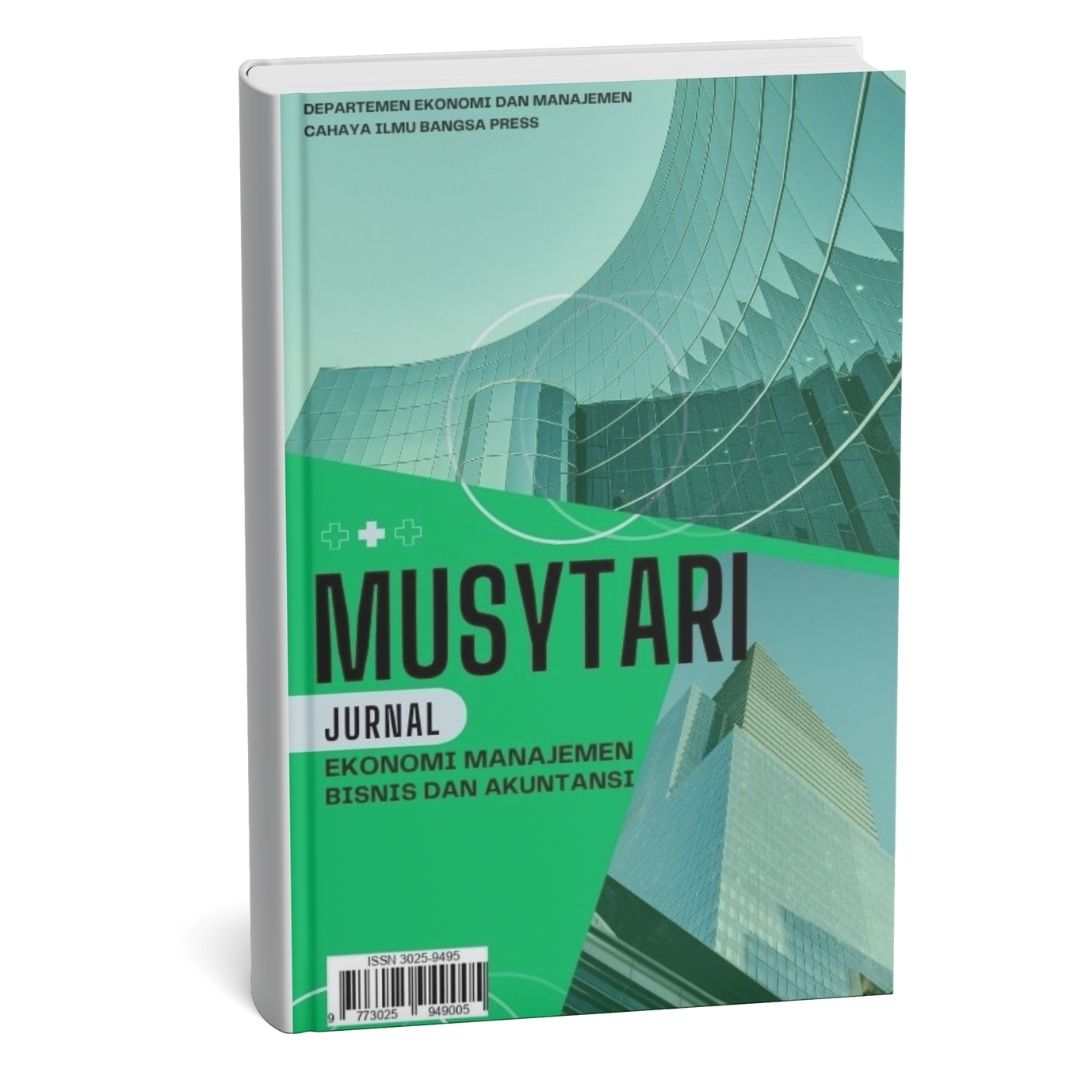PENGARUH KUALITAS LABA TERHADAP KEPEMILIKAN KAS
Main Article Content
Abstract
The focus of the problem in this study is to identify the effect of earnings quality on the company's cash holdings. In this context, earnings quality as measured by accrual quality and earnings persistence will be analyzed to see whether companies with high-quality earnings have more efficient cash management compared to companies with low-quality earnings. This study was conducted using a purposive sampling method. The population in this study were all consumer goods sector companies listed on the Indonesia Stock Exchange (IDX). All data are sourced from the company's annual financial reports available on the official website of the Indonesia Stock Exchange (https://www.idx.co.id) and the official websites of each company. The data collection method for this study was carried out by documentation and literature study. The data analysis method uses descriptive statistics, classical assumption tests and hypothesis testing. The test results show that earnings quality as proxied by accrual quality has a positive but insignificant effect on cash holdings of consumer goods manufacturing companies on the IDX. Conversely, earnings persistence has a significant negative effect, indicating that the lower the earnings persistence, the higher the cash holdings. Firm size has a positive effect, indicating that large firms tend to hold more cash for operational needs. Meanwhile, leverage has a negative effect, because high debt reduces available cash.
Downloads
Article Details
Section

This work is licensed under a Creative Commons Attribution-NonCommercial-ShareAlike 4.0 International License.
How to Cite
References
Al-Haddad, L., & Al-Ghoul, S. (2023). The Impact of Earnings Quality on Corporate Cash Holdings: Evidence from an Emerging Economy. Journal of Financial Reporting and Accounting.
Ali, S., Ullah, M., & Ullah, N. (2016). Determinants of Corporate Cash Holdings: A Case of Textile Sector in Pakistan. 5.
Anggrahini, N., Hariyani, D. S., & Sulistiyowati, L. N. (2023). Growth Opportunity, Leverage, Net Working Capital and Firm Size on Cash Holding. 751–759.
Ayu, R. D. (2024). Pengertian Bursa Efek, Fungsi, Cara Kerja, dan Sejarahnya. Koran.Tempo.Co.
Bangun, N., & Natsir, K. (2022). The Effect of Operating Cash Flow, Net Working Capital, and Earning Quality on Cash Holding of Consumer Goods Companies. Atlantis Press International B.V.
Canina, L., & Potter, G. (2018). Determinants of Earnings Persistence and Predictability for Lodging Properties. 60.
Chada, S., & Varadharajan, G. (2024). Earnings Quality, Institutional Investors and Corporate Cash Holdings: Evidence from India. International Journalof
Cindy, N., Chelsya, & Fernanda, V. (2023). Pengaruh Firm Size, Leverage dan Capital Expenditure Terhadap Cash Holding. 4, 350–363.
Darmawan, K., & Nugroho, V. (2021). Pengaruh Profitabilitas, Firm Size, Leverage, Dan Net Working Capital Terhadap Cash Holding. 564–580.
García-Teruel, P. J., Martínez-Solano, P., & Pedro Sánchez-Ballesta, J. (2009). kualitas akrual and Corporate Cash Holdings. Accounting and Finance, 49, 95–115.
Ghozali, I. (2018). Aplikasi Analisis Multivariate dengan Program IBM SPSS 25 Edisi 9.
Hassan, N. U., Imran, M. M., Amjad, M., & Hussain, M. (2014). Effects of Working Capital Management on Firm Performance: An Empirical Study of Non-financial listed Firms in Pakistan. International Journal of Academic Research in Business and Social Sciences, 4, 114–132.
Hayes, A. (2024). What Is Financial Leverage, and Why Is It Important? Investopedia.Com.
Indrarini, S. (2019). Nilai Perusahaan Melalui Kualitas Laba (Good Corporate & Kebijakan Perusahaan) (N. Azizah, Ed.). Scopindo Media Nusantara.
Iskandrani, M., Yaseen, H., Alzoubi, T., & Almaharmeh, M. (2020). Earnings Quality and Cash Holdings of Listed Firms in Jordan. In Academy of Accounting and Financial Studies Journal (Vol. 24, Issue 6).
Kaltsum, D., & Sebrina, N. (2019). Pengaruh Kualitas Laba Dalam Memoderasi Hubungan Kepemilikan Kas dan Efisiensi Perusahaan (Studi Empiris pada Perusahaan Manufaktur yang Terdaftar di Bursa Efek Indonesia Tahun. Wahana Riset Akuntansi, 7(1), 1477–1492.
Khuong, N. V., Liem, N. T., & Minh, M. T. H. (2020). Earnings Management and Cash Holdings: Evidence from Energy Firms in Vietnam. Journal of International Studies, 13(1), 247–261.
Lebert, S., Mohrmann, U., & Stefani, U. (2020). Rounding Up Performance Measures in German Firms: Earnings Cosmetics or Earnings Management on a Larger Scale? Journal of Business Finance and Accounting, Forthcoming.
Luas, C. O. A., Kawulur, A. F., & Tanor, L. A. O. (2021). Pengaruh Likuiditas, Struktur Modal, Pertumbuhan Laba dan Profitabilitas Terhadap Kualitas Laba Perusahaan Manufaktur Sektor Industri Barang Konsumsi yang Terdaftar di Bursa Efek Indonesia (BEI) Periode 2017-2019. JAIM: Jurnal Akuntansi Manado, 2(2).
Managerial Finance, 20(1), 247–277. https://doi.org/10.1108/IJMF-05- 2022-0224
Mansali, H., Derouiche, I., & Jemai, K. (2019). kualitas akrual, Financial Constraints, and Corporate Cash Holdings. Managerial Finance, 45(8), 1129–1145.
Myers, S. C., & Maljuf, N. S. (1984). Corporate Financing and Investment Decisions When Firms Have Information that Investors Do Not Have. 13, 187–221.
Priskanodi, J., Trisnaningsih, S., & Aprilisanda, I. D. (2022). Pengaruh Ukuran Perusahaan, Leverage dan Likuiditas terhadap Tax Avoidance. Jurnal Ilmiah Riset Akuntansi, 11(2), 200–209.
Saputri, E., & Kuswardono, A. (2019). Pengaruh Profitabilitas, Leverage, Firm Size, dan Growth Opportunity Terhadap Cash Holding Perusahaan (Studi Kasus Perusahaan Manufaktur yang Terdaftar Pada Bursa Efek Indonesia Periode Tahun 2013-2017) . 2, 91–104.
Yıldırım, D., & Çelik, A. K. (2021). Testing The Pecking Order Theory of Capital Structure: Evidence from Turkey Using Panel Quantile Regression Approach. Borsa Istanbul Review, 21(4), 317–331.
